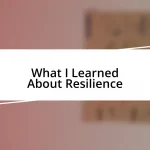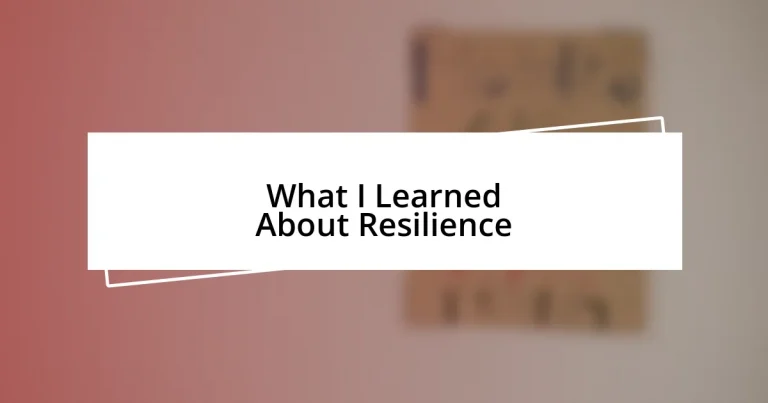Key takeaways:
- Resilience involves bouncing back from setbacks and adapting to challenges, transforming hardships into opportunities for growth.
- Practicing mindfulness enhances resilience by fostering emotional regulation and creating space for thoughtful responses during difficult times.
- Building strong support networks and practicing vulnerability strengthen relationships and promote a sense of connection during adversity.
- Measuring resilience growth through self-reflection and sharing experiences with others can illuminate personal progress and development.
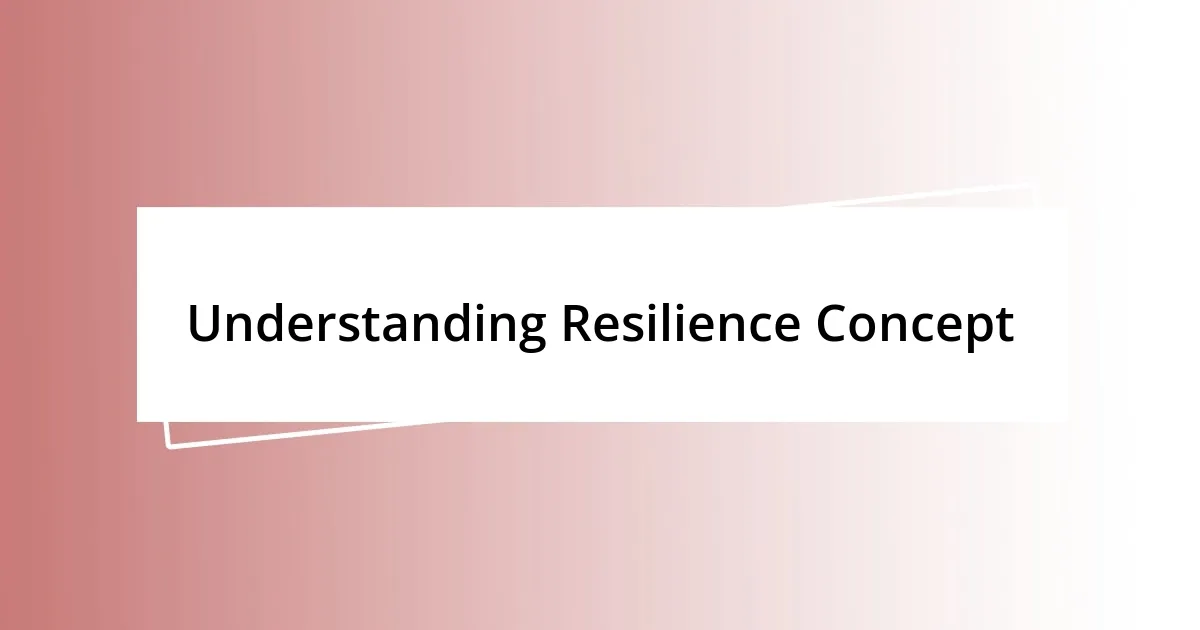
Understanding Resilience Concept
Resilience, at its core, is the ability to bounce back from setbacks and adapt to challenging circumstances. I remember a time in my life when I faced a significant professional setback. It felt like the ground had shifted beneath my feet, making me question my abilities. Was this a failure or an opportunity to grow? This experience taught me that resilience is not merely enduring hardships; it’s about learning to find strength in vulnerability.
When I think about resilience, I often reflect on how it intertwines with our emotional landscape. It’s fascinating to realize that our emotions aren’t just reactions; they can serve as the fuel for resilience. I recall feeling overwhelmed after a personal loss, yet somehow, those moments of deep sadness eventually transformed into a drive to honor that memory by living fully. Isn’t it amazing how even the heaviest moments can lead to growth?
Additionally, resilience is often about our mindset. I’ve noticed that the language we use with ourselves can either hinder or enhance our ability to cope. For instance, shifting from “Why is this happening to me?” to “What can I learn from this?” can dramatically change our perspective. It’s like flipping a switch that lights up new paths of possibility. Have you ever tried reframing your thoughts in tough times? I guarantee it can reshape your experience entirely.
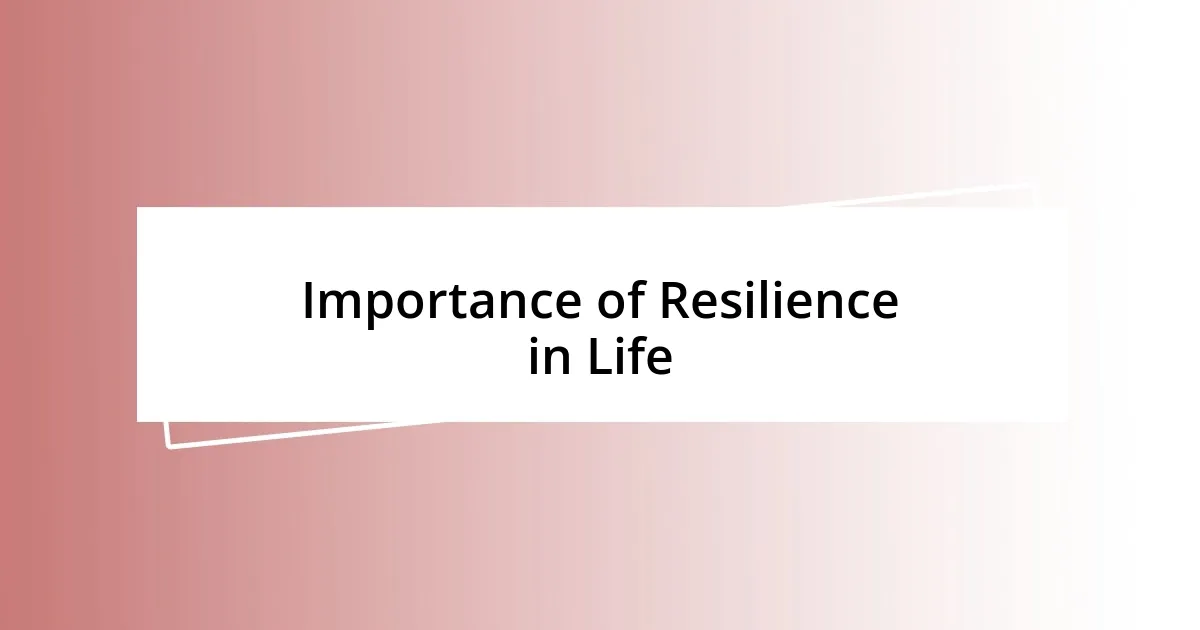
Importance of Resilience in Life
Resilience plays a crucial role in navigating life’s unpredictable landscape. I learned this firsthand when I encountered unexpected job losses. It was disheartening at first, but I quickly realized that those challenges pushed me to explore new paths I hadn’t considered before. Embracing that upheaval transformed my outlook and opened doors I didn’t know existed.
When reflecting on resilience, I often consider how it shapes our personal growth and relationships. Here are a few key points I’ve gathered:
- Resilience fosters a greater sense of control over one’s life circumstances, reducing feelings of helplessness.
- It strengthens relationships as shared challenges can deepen connections and trust among friends and family.
- Cultivating resilience enhances problem-solving skills, empowering us to approach obstacles with creativity and optimism.
- Resilient individuals often experience increased self-esteem, as they recognize their ability to overcome adversity.
- Finally, resilience encourages us to balance our emotional responses, enabling us to navigate stress more effectively.
Seeing how resilience influences these areas has truly enriched my life, and I find myself better equipped to handle whatever comes my way.
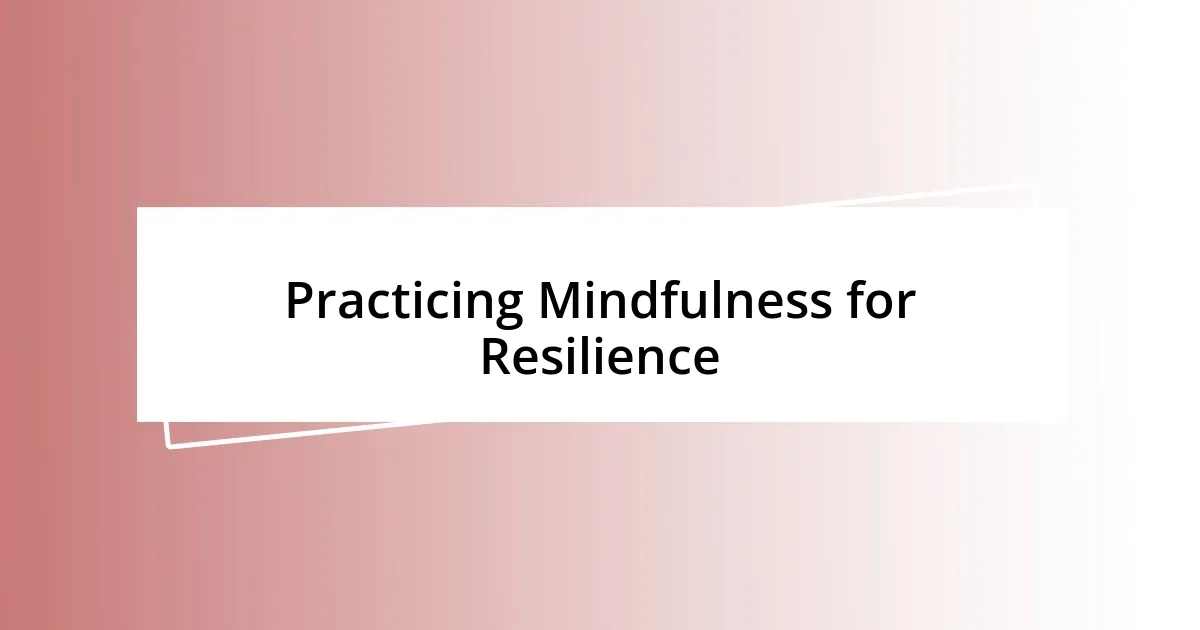
Practicing Mindfulness for Resilience
Practicing mindfulness has been a game changer for enhancing resilience in my life. I remember a particularly stressful week where everything seemed to be colliding at once. By taking just a few minutes each day to practice mindfulness, I noticed a significant decrease in anxiety and an increased ability to focus on finding solutions. It’s incredible how simply being present can help me navigate life’s hurdles with a much clearer mind.
Something I discovered about mindfulness is its ability to create emotional space. During moments of overwhelming frustration, I would pause, take a deep breath, and ground myself. This practice taught me to observe my feelings rather than react impulsively. By creating this space, I could respond with thoughtfulness, transforming potential emotional outbursts into constructive discussions. Have you noticed how just a moment of stillness can shift your perspective?
In embracing mindfulness, I’ve learned to cultivate a greater appreciation for the small victories in daily life. For instance, I celebrate my ability to handle challenges, however minor they may seem. Practicing gratitude and being present has made it easier for me to bounce back and maintain focus. It’s these small moments that, when acknowledged, weave together a stronger fabric of resilience.
| Mindfulness Practice | Impact on Resilience |
|---|---|
| Breath Awareness | Reduces stress and anxiety, fostering clarity during challenges |
| Gratitude Journaling | Enhances emotional regulation, boosting overall attitude towards adversity |
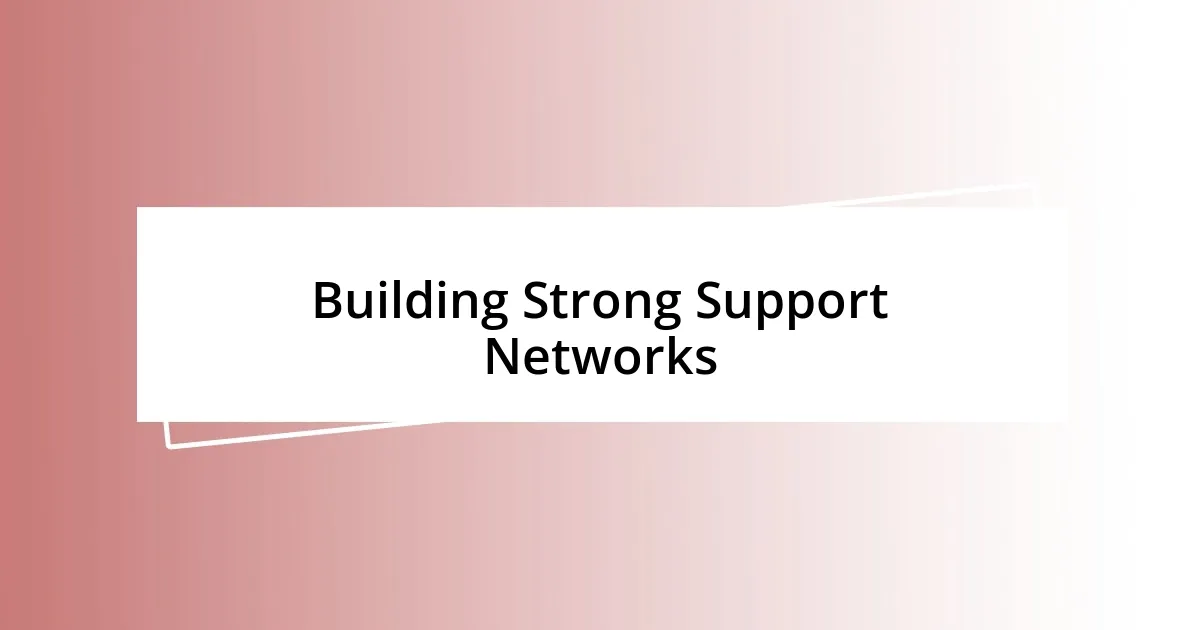
Building Strong Support Networks
Building strong support networks has been vital in my journey toward resilience. I recall a time when I felt isolated after a tough breakup. It was a low point, but reaching out to friends and family helped me navigate that dark season. They offered a listening ear, practical advice, and emotional support, reminding me that I wasn’t alone. It made me realize how crucial it is to surround ourselves with people who uplift us during hard times.
Have you ever experienced a moment when just one conversation turned your entire day around? I vividly remember a call with an old friend who shared their own challenges. As we talked, I felt a genuine connection that helped me open up about my feelings. That exchange not only reinforced our bond but also reminded me of the importance of vulnerability in relationships. Creating an environment where we can be open fosters deeper connections and shared understanding.
I’ve discovered that intentionality matters when building support networks. Instead of waiting for tough times, I now make an effort to invest in relationships regularly. Whether it’s scheduling coffee dates or simply checking in with a text, these small gestures keep the connection alive. It’s about nurturing those bonds before the storms hit. How do you cultivate your own support system? Reflecting on this can inspire us to be proactive in creating the community we need to thrive.
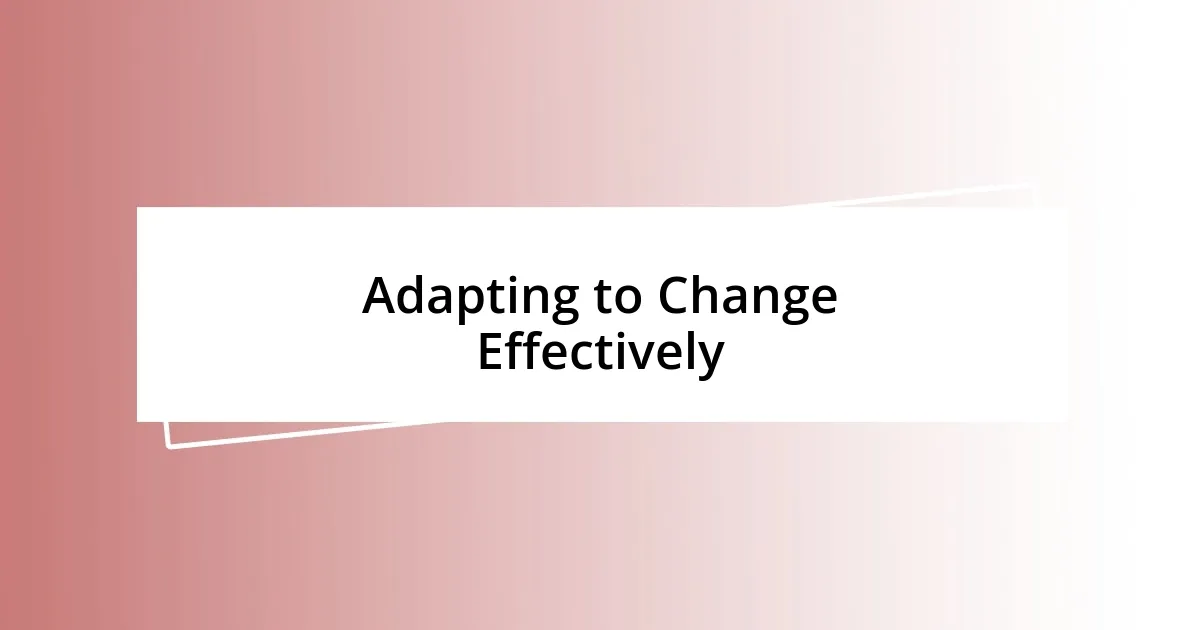
Adapting to Change Effectively
Adapting to change effectively is something I’ve come to understand deeply through various life experiences. I remember when I was suddenly reassigned to a new job role that seemed completely out of my comfort zone. Initially, I felt overwhelmed, but rather than grumble, I chose to lean into the unfamiliarity and treat it as an opportunity to grow. Embracing that change allowed me to uncover skills and strengths I didn’t even know I had.
One powerful lesson I learned is the importance of flexibility. I recall a time when my travel plans fell through unexpectedly, leading to a cascading series of disruptions. Instead of succumbing to frustration, I decided to explore new options. By pivoting my itinerary, I ended up discovering a charming little café that became my favorite spot. It struck me how adapting to setbacks can lead to delightful surprises if we’re open to them. Have you ever found a silver lining during a challenging transition?
I’ve also realized that maintaining a positive mindset is essential when facing change. The moments when I’ve embraced uncertainty often turned into significant turning points. For example, when my university switched to online classes, I initially resisted the change. However, once I committed myself to engaging fully with the new format, I discovered innovative ways to connect with classmates and professors. This adaptability didn’t just help me survive the situation; it empowered me to thrive. Isn’t it fascinating how embracing change can reshape our perspective and lead to unexpected opportunities?

Strategies for Overcoming Adversity
One of the most effective strategies I’ve found for overcoming adversity is setting small, achievable goals. When I was faced with the overwhelming challenge of starting a new fitness routine, it felt daunting. Instead of committing to an intense workout right away, I focused on a simple goal: walking for just ten minutes each day. This little shift made the process feel manageable and, over time, those small victories built my confidence, demonstrating that progress doesn’t have to be monumental; it just has to start somewhere.
Another critical element in my journey has been practicing mindfulness and self-compassion. I distinctly remember a day when a significant setback left me feeling defeated. Instead of spiraling into self-doubt, I took a moment to breathe deeply and reflect on my emotions. This practice helped me acknowledge my feelings without judgment and reminded me that it’s okay to struggle. Have you ever paused in the midst of a storm to find that calm within? It’s a powerful reminder that taking care of ourselves is crucial when navigating life’s challenges.
Seeking knowledge and learning from experiences also plays a vital role in building resilience. I once attended a workshop on overcoming hardships where the speaker shared their story of adversity. Hearing how they transformed challenges into stepping stones inspired me to reframe my own struggles. It led me to ask, “What can I learn from this?” That mindset shift often turns obstacles into opportunities for growth, pushing me to seek solutions instead of wallowing in difficulties. How often do we pause to reflect on the lessons hidden within our challenges? That awareness can be a game-changer.
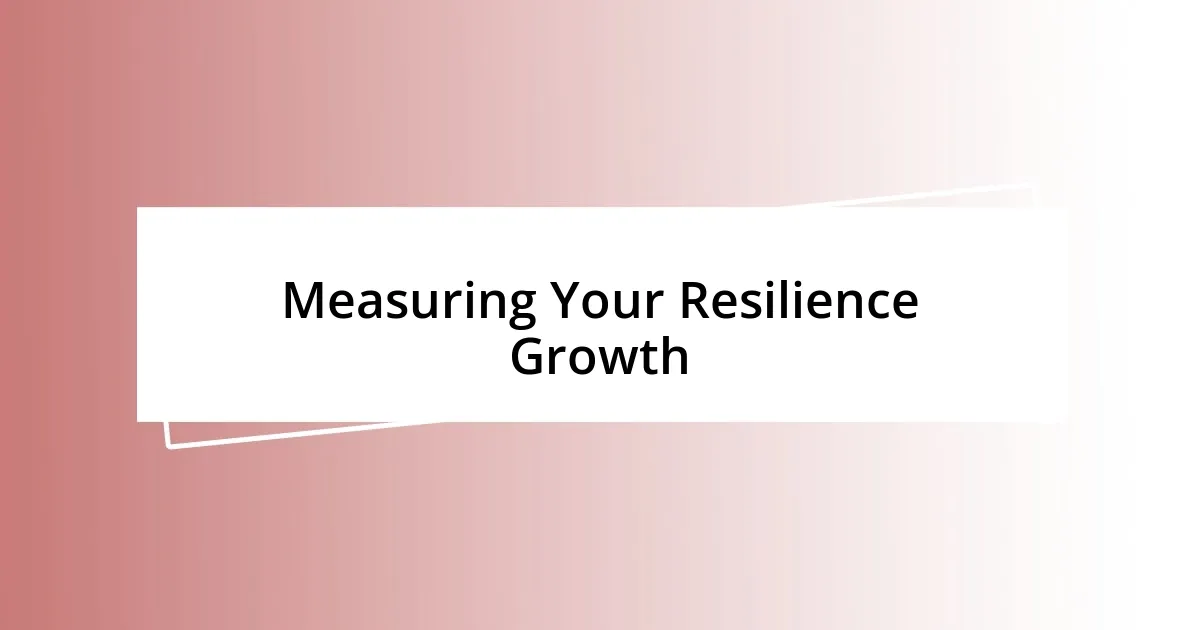
Measuring Your Resilience Growth
Measuring resilience growth isn’t just about tracking milestones; it’s about reflecting on the transformation within ourselves. I’ll never forget a tough time when I faced a prolonged job search. Each rejection stung, but instead of letting it defeat me, I started journaling my feelings and thoughts. When I look back now, I can pinpoint exactly how I grew, not just in persistence, but in my self-understanding and how I articulated my strengths. Isn’t it fascinating how self-reflection can reveal a roadmap of progress?
Another insightful method I’ve found is to create a personal resilience scale. I decided to rate my responses to various stressors on a scale of one to ten. Initially, I would respond at a low level, feeling overwhelmed and reactive. Over time, as I consciously practiced coping strategies, I noticed those numbers creeping upward. This tangible evidence of growth supports the idea that resilience is indeed a skill we can develop. Have you ever measured your own responses to challenges? It’s a concrete way to see how far you’ve come.
Lastly, I believe sharing our resilience journeys with others can illuminate our growth. During a recent coffee chat with a friend, we swapped stories about our personal challenges. I was surprised at how much we both had learned. Hearing her experiences made me realize my own struggles had shaped me in remarkable ways. Talking it out not only connected us but illuminated just how much resilience we’ve built. Have you taken the time to share your experiences? The insights from conversations can often be the most revealing.
